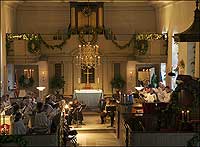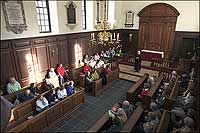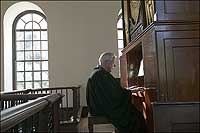Page content
Christmas Music in Colonial Days
by John Turner
Photos by Dave Doody
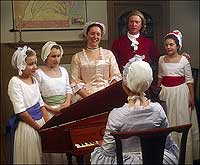
The family of Williamsburg's silversmith James Geddy Jr.—portrayed by Suzanna Winder, Caroline Hollis, Frances Burroughs, Terry Yemm, Amy Player, and Grace MacArthur—joins in Christmas song around a parlor spinet.
Now Christmas comes, 'tis fit that we,—Virginia Almanac, eighteenth century
hould feast and sing and merry be.
Keep open house, let fiddlers play
A fig for cold, sing care away.
The year is 1774. The colony is Virginia. It is the middle of December. Williamsburg's George Wythe, his wife, Elizabeth, and their household are gathered in the parlor around a blazing fire lustily singing the words of Isaac Watts's best known Christmas hymn, "Joy to the World." Theoretically, this could have happened, but as far as we know, it did not. Even if it had, chances are we wouldn't recognize the tune they were singing. The melody we know did not get married to Watts's words until 1820. Wythe did not leave behind a diary or journal chronicling his activities for December 1774. Of those of his contemporaries who did keep diaries or journals, many do not mention Christmas on, before, or after the twenty-fifth of December. In general, eighteenth-century Virginians left us scant information about the observance and celebration of Christmas, and Christmas music, as we think of it, is a more elusive subject.
Songs with a Christmas theme can be found as early as the fourth century—songs like Jesus refulsit omnium. The church developed chants, litanies, and hymns to accompany worship celebrating the holy day of Christ's birth. But these were in Latin and not generally the kinds of tunes Bing Crosby would turn into million sellers. For centuries music associated with Christmas struggled for quiet existence behind the scenes as the church tried to prohibit holy day-linked celebrations that might lead to dancing. For more than five hundred years now, the quintessential music of Christmas has been the carol, a form based on dance music.
According to The Oxford Book of Carols, "The carol was in fact a sign ...of the emancipation of the people from the old Puritanism which had for so many centuries suppressed the dance ...denounced communal singing, and warred against the tendency of the people to disport themselves in church on the festivals." Carols and ballads arose as forms in the fifteenth century as popular music and showed the natural desire to use music in everyday life to tell stories and inspire movement. One relatively early but still recognizable carol appearing in a collection printed in 1521 is the "Boar's Head Carol," traditionally sung every Christmas at Queen's College, Oxford. By tradition, a scholar from the college, confronted in the woods by a wild boar, defended himself with the only weapon at hand, which happened to be a copy of Aristotle. He thrust it down the beast's throat, choking it to death. A classic example of the pen being mightier than the sword. "Coventry Carol," dating from 1591 or earlier, is often associated with the Pageant of the Shearmen and Tailors and the biblical story of the slaughter of the innocents in King Herod's attempt to eliminate the infant Messiah.
So, from the fifteenth century to the eighteenth century, would popular music be allowed to develop unimpeded? Well, no—not exactly. The fifteenth century wasn't the end of governmental and ecclesiastical pressure against popular music, even music celebrating the birth of Christ. The use and popularity of carols increased throughout the sixteenth century and into the seventeenth century, only to come to a screeching halt, at least in English-speaking countries, with the dissolution of the British monarchy. In 1647 Parliament abolished the celebration of Christmas, forty years after the establishment of the settlement in Jamestown. The "No Christmas" policy was reiterated by Parliament in 1652 with the following resolution: "That no observation shall be had of the five and twentieth day of December commonly called Christmas-Day; nor any solemnity used or exercised in churches upon the day in respect thereof." Though this policy was not enforced in Virginia, it is easy to speculate that this is at least one of the reasons that seventeenth- and eighteenth-century colonists were fairly close-mouthed about the celebration of Christmas. In New England colonies, Christmas was ignored not only in the seventeenth century but well into the nineteenth. Boston public schools were still open on Christmas Day in the 1870s and missing work on the twenty-fifth of December was grounds for dismissal.
The eighteenth century did, however, offer relief from this Puritan Grinchness in the form of hymns written by Watts, the so-called Liberator of the English Hymn, and the flood of hymn writers who followed his lead in what has been referred to as the Golden Age of Hymns. Watts published his most famous Christmas hymn, "Joy to the World," based on Psalm 98, in 1719. Here is where the nomenclature can become confusing. Any group of friends or acquaintances that venture out this Christmas season to "go caroling" is likely to include "Joy to the World" among its offerings. But it is not a carol in the fifteenth-century sense. It is a carol only to the degree that in modern usage the word is used to denote any religious or traditional song that has been for some time in the body of those pieces typically sung during the Christmas season. This repertoire now includes some old carols, some newer carols, and lots of hymns that we now think of as carols though they are really hymns. Watts did not write or suggest any tune to sing his version of Psalm 98 to. Any tune that fits the meter of the poem will work—which means for example, that the tune "Arlington," written by Thomas Arne in 1762, can be used for "Joy to the World" and "Amazing Grace." Don't try this for the first time before a crowd—you'll find yourself forgetting words you've known since you were three, when you try to put them to a different tune.
What tune one uses, of course, makes a difference in the popularity and memorability of a hymn or carol. "Joy to the World" sung to the tune "Arlington" is reasonable and nice but it is not inspiring. Watts's words had to wait for a hundred years, long after his death, to be paired with the music we find so inspiring today. Dr. Lowell Mason set the words to its current tune in the 1820s, and tune and words have stayed together since. So did eighteenth-century Virginians ever sing "Joy to the World" during the Christmas season? Well, they could have, but not in Williamsburg's Bruton Parish Church, accompanied by one of the few church organs in Virginia at the time, and not to the tune we associate with the words. Plantation tutor Philip Fithian's account of his Christmas Eve, 1775, admits an admiration of Mr. Watts's hymns, and the enjoyment of singing them in good company that evening, but doesn't say whether hymns we associate with Christmas were included in the evening's entertainment.
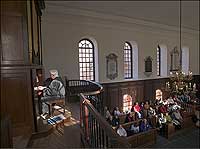
Jock Darling invites holiday-season guests to the Wren Chapel at the College of William and Mary for programs of organ music.
Another Christmas carol-hymn that could have been sung at the hypothetical Wythe family Christmas is "Hark the Herald Angels Sing" by the most prolific writer of English hymns, Charles Wesley. A generation younger than Watts, Wesley was the youngest of eighteen children born to a Church of England minister and his wife. It is said that Wesley wrote an average of ten verses every day for more than fifty years. He and his brother John Wesley published fifty-six collections of hymns in three years. Charles Wesley's total output of hymns depends on how you count. Some of his hymns started out with thirty or more verses only to be converted into six or seven hymns by the editing of his brother. Taking these kinds of conversions into consideration, Charles Wesley wrote 8,989 hymns compared to 697 by Watts, more than 400 by Phillip Doddridge, and 280 by John Newton, the author of "Amazing Grace."
Once again, the original version wouldn't be recognizable to many listeners today. In the first place, when Wesley published this hymn in 1739, its first words were "Hark! How All the Welkin Rings." "Welkin," which means "vault of heaven," was already an antiquated word in the second quarter of the eighteenth century. Wesley's brother and other friends were not shy about altering his works when they thought it would serve a good purpose. John Wesley frequently changed words and theological implications, and turned twenty verse hymns into five four-verse hymns. The evangelist George Whitefield thought the word "welkin" would confuse people and changed the first line of Wesley's hymn to "Hark the Herald Angels Sing" and included it in his own anthology of hymns published in 1753.
And, as usual, no tune was specified. The melody more often today paired with the hymn "Take My Life and Let It Be" works with Wesley's words along with many others. "Hark the Herald" was not set to the tune familiar today until 1855.
Which brings us again to a fairly exasperating question: were there any songs being sung at Christmastime to tunes that we would recognize today? The answer is: "We don't know for sure." Nevertheless, there are some that in spite of the lingering Puritanical influences in the American colonies are very likely to have been sung. One such tune would be "Greensleeves."
"Greensleeves" is probably the closest thing to a best seller anyone would have known in the eighteenth century. More than two hundred years old by the 1770s, it was still a very popular tune, and still is. But today's popular Christmas version, "What Child Is This," was not written until well into the nineteenth century. Colonials would have been familiar with a seventeenth-century song to the old tune called "The Old Year Now Away Has Fled," which obviously has to do with the changing year and not Christmas.
Other than that, "Deck the Halls," an old Welsh carol, may be a candidate for a song that we'd recognize, words and tune, if we could travel to 1774. But it is the secular version of a carol that begins, "Now the joyful bells a-ringing, All ye mountains, praise the Lord!" The pertinent question is whether either version had been translated into English in time for Wythe's 1774 sing- along—and the answer is probably not.
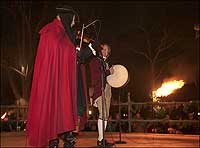
Author John Turner, an accomplished fiddler, entertains at Colonial Williamsburg's Grand Illumination.
But what of Fithian's journal entry of Saturday, December 18, 1773: "Nothing is to be heard of in conversation, but the Balls, the Fox-hunts, the fine entertainments, and the good fellowship, which are to be exhibited at the approaching Christmas"? Fithian's association with the family of Robert Carter of Nomini Hall gave him first-hand experience of how Christmas was being kept by at least that particular gentry family in 1770s Virginia. Carter was playing an impressive array of musical instruments popular at the time, including Benjamin Franklin's invention, the glass harmonica. For Wednesday, December 22, 1773, Fithian wrote: "Evening Mr. Carter spent in playing on the Harmonica. It is the first time I have heard the instrument. The music is charming! He played, 'Water Parted from the Sea.'" This was a song from the opera Artaxerxes, first performed in London in 1762. Fithian says of the glass harmonica, "The notes are clear and inexpressibly soft, they swell, and are inexpressibly grand. The sounds very much resemble the human voice, and in my opinion they far exceed even the swelling organ." It is clear that there was music at Christmas, but apparently not Christmas music.
The balls and possibly some of the other entertainments no doubt had music provided by persons playing fiddles, flutes, harpsichords, and other popular instruments. But if people were playing music that they or we would consider particular to Christmas, no one bothered to say so.
Today we think of Handel's Messiah as being a Christmas holiday tradition, but the first performance was in April 1742 at the Music Hall on Fishamble Street in Dublin. The performance was a benefit "for relief of the Prisoners in the several Gaols, and for the support of Mercer's hospital in Stephen's Street and of the charitable Infirmary on the Inns Quay...." The review printed in the Dublin Journal was an indication of things to come, but not an indication of how it would become entwined with modern holiday tradition.
On Tuesday last (13 April, 1742) Mr. Handel's Sacred Grand Oratorio, the Messiah, was performed at the New Musick-Hall in Fishamble-street; the best Judges allowed it to be the most finished piece of Musick. Words are wanting to express the exquisite Delight it afforded to the admiring crouded Audience. The Sublime, the Grand and the Tender, adapted to the most elevated, majestic and moving words composed to transport and charm the ravished Heart and Ear. It is but justice to Mr. Handel that the World should know, he generously gave the Money arising from this Grand Performance to be shared by the Society for relieving Prisoners, the Charitable Infirmary, and Mercer's Hospital, for which they will ever gratefully remember his Name. There were about 700 people in the room (built for 600) and the sum collected for that Noble and Pious Charity amounted to about A34,001.00 out of which A31,271 goes to each of the three great and pious Chairities.
Handel not only created a timeless work of art but delighted and satisfied the critics. So, when did Handel's Messiah make it to America? It was performed in colonial America in 1770, two years before it was first performed in Germany, Handel's home country. Once again, whisking ourselves to the Wythe parlor in 1774, is it likely anyone was humming the "Hallelujah Chorus"? No.
Christmas was different in eighteenth-century Virginia. Some celebrated and some did not. Music, singing, and dancing were part of the festivities for those that celebrated. For the most part, however, as far we know, it was the same music, singing, and dancing that was taking place at most other times of colonial celebration.
![]()
![]() The content on this page requires that your browser be multimedia friendly. Click on the button to the right to download the free software, available from apple.com.
The content on this page requires that your browser be multimedia friendly. Click on the button to the right to download the free software, available from apple.com.
From the CD "A Grand Entertainment"
Buy the CD at www.williamsburgmarketplace.com
Click on each song title to hear the sound clip.
"There Was a Pig Went Out to Dig" sung by Lee Welch
"Lo' How a Rose E'er Blooming" sung by the William & Mary Botetourt Chamber Singers
From the CD "Songs for a Williamsburg Christmas"
Available soon from www.williamsburgmarketplace.com
John Turner is program development manager in Colonial Williamsburg's department of public history development.

